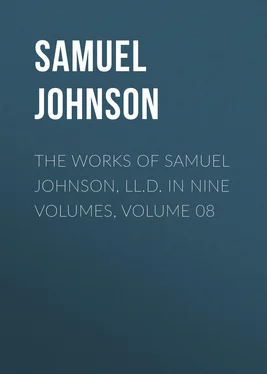Конец ознакомительного фрагмента.
Текст предоставлен ООО «ЛитРес».
Прочитайте эту книгу целиком, на ЛитРес.
Безопасно оплатить книгу можно банковской картой Visa, MasterCard, Maestro, со счета мобильного телефона, с платежного терминала, в салоне МТС или Связной, через PayPal, WebMoney, Яндекс.Деньги, QIWI Кошелек, бонусными картами или другим удобным Вам способом.
The difficulty of settling Prior’s birthplace is great. In the register of his college he is called, at his admission by the president, Matthew Prior, of Winburn, in Middlesex; by himself, next day, Matthew Prior, of Dorsetshire, in which county, not in Middlesex, Winborn, or Winborne, as it stands in the Villare, is found. When he stood candidate for his fellowship, five years afterwards, he was registered again by himself as of Middlesex. The last record ought to be preferred, because it was made upon oath. It is observable, that, as a native of Winborne, he is styled filius Georgii Prior, generosi; not consistently with the common account of the meanness of his birth. Dr. J.
Samuel Prior kept the Rummer tavern near Charing-cross, in 1685. The annual feast of the nobility and gentry living in the parish of St. Martin in the Fields was held at his house, Oct. 14, that year. N.
He was admitted to his bachelor’s degree in 1686; and to his master’s, by mandate, in 1700. N.
Spence.
He received, in September, 1697, a present of two hundred guineas from the lords justices, for his trouble in bringing over the treaty of peace. N.
It should be the earl of Dorset.
Swift obtained many subscriptions for him in Ireland. II.
Spence.
Spence.
Spence; and see Gent. Mag. vol l vii. p. 1039.
Richardsoniana.
It is to be found in Poggii Facetiæ. J.B.
The same thought is found in one of Owen’s epigrams, lib. i. epig. 123. and in Poggii Facetiæ. J.B.
Prior was not the first inventor of this stanza; for excepting the alexandrine close, it is to be found in Churchyard’s Worthies of Wales. See his introduction for Brecknockshire. J.B.
Mr. Malone has ascertained both the place and time of his birth by the register of Bardsey, which is as follows: “William, the sonne of Mr. William Congreve of Bardsey Grange, was baptised Febru. 10th, 1669.” See Malone’s Dryden, vol. i. p. 225. J.B.
Dec. 17, 1714, and May 3, 1718, he received a patent for the same place for life.
The Historical Register says Jan. 19. æt. 57.
“Except!” Dr. Warton exclaims, “Is not this a high sort of poetry?” He mentions, likewise, that Congreve’s opera, or oratorio, of Semele, was set to musick by Handel; I believe, in 1743.
At Saddlers’ hall.
The book he alludes to was Nova Hypothesis ad explicanda febrium intermittentium symptomata, &c. Authore Gulielmo Cole, M.D. 1693.
“The Kit-cat Club,” says Horace Walpole, “though generally mentioned as a set of wits, were, in fact, the patriots who saved Britain.” See, for the history of its origin and name, Addisoniana, i. 120; Ward’s complete and humorous account of the remarkable Clubs and Societies. Ed.
He was born at Shelton, near Newcastle, May 20, 1683; and was the youngest of eleven children of John Fenton, an attorney-at-law, and one of the coroners of the county of Stafford. His father died in 1694; and his grave, in the church-yard of Stoke upon Trent, is distinguished by the following elegant Latin inscription from the pen of his son:
H.S.E
JOHANNES FENTON,
de Shelton
antiqua stirpe generosus:
juxta reliquias conjugis
CATHERINÆ
forma, moribus, pietate,
optimo viro dignissimæ:
Qui
intemerata in ecclesiam fide,
et virtutibus intaminatis enituit;
necnon ingenii lepore
bonis artibus expoliti,
ac animo erga omnes benevolo,
sibi suisque jucundus vixit
Decem annos uxori dilectee superstes
magnum sui desiderium bonis
omnibus reliquit,
anno{salutis humanai 1694,
{ætatis suffi 56
See Gent. Mag. 1791, vol. lxi. p. 703. N
He was entered of Jesus college, and took a bachelor’s degree in 1704: but it appears, by the list of Cambridge graduates, that he removed, in 1726, to Trinity hall. N.
1717. M.
Ford was Johnson’s relation, his mother’s nephew, and is said to have been the original of the parson in Hogarth’s Modern Midnight Conversation. See Boswell, i. and iii. Ed.
July 16.
Spence.
Shiels, Dr. Johnson’s amanuensis, who says, in Cibber’s Lives of the Poets, that he received this anecdote from a gentleman resident in Staffordshire. M.
Goldworthy does not appear in the Villare. Dr. J.—Holdsworthy is probably meant.
Spence.
This mishap of Gay’s is said to have suggested the story of the scholar’s bashfulness in the 157th Rambler; and to similar stories in the Adventurer and Repton’s Variety. Ed.
It was acted seven nights. The author’s third night was by command of their royal highnesses. R.
Spence.
Ibid.
Ibid.
Ibid.
To Trinity college. By the university register it appears, that he was admitted to his master’s degree in 1679; we must, therefore, set the year of his birth some years back. H.
We need not remark to any of our readers, but to those who are not Oxford men, that Pullen’s name is now remembered in the university, not as a tutor, but by the venerable elm tree which was the term of his morning walks. “I have the honour to be well known to Mr. Josiah Pullen, of our hall above-mentioned, (Magdalen hall,) and attribute the florid old age I now enjoy to my constant morning walks up Headington lull, in his cheerful company.” Guardian, No. 2. Ed.
The vicarage of Willoughby, which he resigned in 1708. N.
Читать дальше












